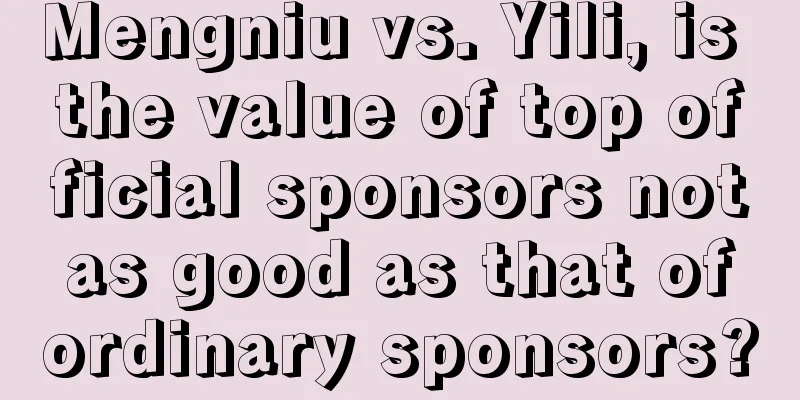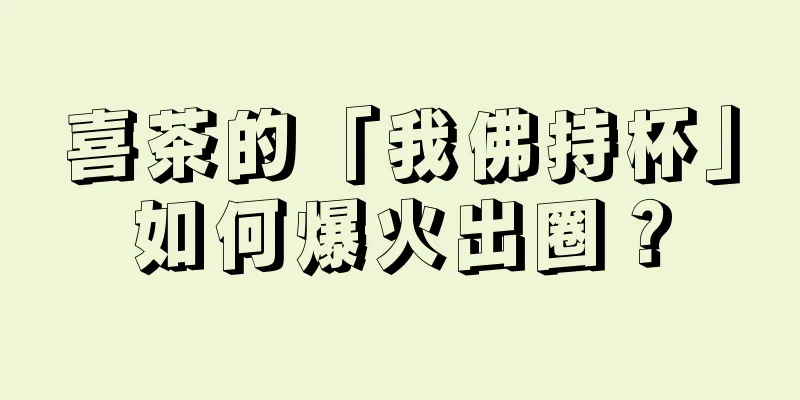Mengniu vs. Yili, is the value of top official sponsors not as good as that of ordinary sponsors?

In 2023, the total revenue of Yili will exceed 120 billion yuan, and that of Mengniu will be close to 100 billion yuan; the market value of Yili will exceed 150 billion yuan, and that of Mengniu will be 53.1 billion Hong Kong dollars. The two giants together account for half of China's dairy industry, leading by a huge margin. The battle between the top two has never stopped. When the focus of the competition is on the Paris Olympics, the leaders want to consolidate their position, and the laggards hope to fight back. In 2019, Mengniu and Coca-Cola won the official sponsorship of the Olympic Games, taking the lead in advance. Yili publicly accused it of winning unfairly. The competition between the two dairy companies has long been on the table. Yili, which has obtained the designated dairy rights of the Chinese delegation, has signed 16 athlete spokespersons. As the Olympics approached, started, and gradually reached a climax, the traffic volume tilted towards Yili. New Chinese-style print ads before the game, bus tours, and Lu Yu's memes appeared behind every important gold medal after the game, and even released materials in advance due to work errors, causing a public opinion crisis. Yili is the undisputed traffic winner. The Olympics is a big gamble. Yili became the dairy product sponsor of the 2008 Beijing Olympics. The Olympic dividends helped Yili to grow rapidly. In the following years, its growth rate was higher than that of Mengniu. It finally surpassed Mengniu in 2011 and has been leading ever since. At that time, Yili only received one of the three domestic sponsorships of the Beijing Olympic Organizing Committee, which was far less important than Mengniu's top partner of the International Olympic Committee (IOC) this year. It is clear that Mengniu wants to make a comeback. According to public reports, Mengniu spent $3 billion in 2019 to win the official sponsorship rights for the six Summer and Winter Olympics in 12 years. The value of sports marketing lies in long-termism. There are too many successful cases in the history of sports business that prove the importance of "accompanying", such as Coca-Cola and the Olympics, Heineken and the Champions League, Jordan and Nike... Mengniu's vision is by no means limited to Paris. Of course, in the new media environment, the way of playing, thinking and evaluation criteria of sports marketing have changed. Traffic logic is dominant. The pursuit of immediate results and the long-term fishing for big fish are better or worse. Which is more effective? I am afraid that we need to analyze specific issues. Just like the Olympic marketing rookie King Tea Princess Zheng Qinwen alone was enough to win a big victory, Ctrip signed four male athletes born after 2000 (including Pan Zhanle), which was just a short-term low-investment project around the Olympics, and it can also be said to be successful. Digging deep into the differences between the two dairy companies’ Olympic marketing is actually comparing the difference between sponsoring “people” and sponsoring event IP. “People” are the key to leveraging sports traffic, and bundling with events means being friends with time. 1. How Yili became the king of hot spotsThe right time, right place and right people all come to Yili. Yili used the human-wave tactic to block the flow of Olympic traffic. Before the start of the Games, Yili signed 16 athletes at once, covering table tennis, swimming, diving, track and field, tennis and other events, as well as official partners of several national teams. With the status of the designated dairy product of the Chinese delegation, Yili covered almost all possible gold medal spots and hot spots. It is a common practice for brands to form a matrix of spokespersons. Junlebao, a dairy company, sponsors ten national teams, Bawangchaji has signed seven retired active athletes, and Nongfu Spring, Blue Moon and other brands have multiple athletes in their promotional materials. Most brands seek "accuracy", but only companies at Yili's level can achieve all-round coverage. According to China Business News, the "Olympic Marketing Team" is a permanent professional department within Yili. During the preparation period for the Olympics, it is the daily work of this department to find potential athletes as advertising spokespersons. The key to Olympic marketing is to place bets on gold medals, which are the source of almost all hot spots, especially in China. The greater the coverage, the higher the probability. Yili used the most reliable method and did not miss any wave of traffic peaks on the Chinese Internet after the Olympics. The shooting team won the first Olympic gold medal. According to statistics from previous events, one out of every ten gold medals in China came from the shooting team; in the swimming team, Zhang Yufei won the bronze medal despite her menstrual period, and Pan Zhanle won the 100-meter freestyle gold medal, which is as valuable as Liu Xiang's; in the table tennis team, the Shatou combination is the focus as long as they appear; Zheng Qinwen has become a "superstar" in Chinese sports; Quan Hongchan won the gold medal perfectly... Another function of the human wave tactic is to go your own way and leave no way for others. Wang Jiaojiao, general manager of the East China Division of Miaozhen System, a third-party marketing company, said in an interview with the media: "Many experienced brands will have a defensive move. They will book some good IPs or players in advance to prevent competitors from finding an angle to cut in." Dairy companies are big players in sports marketing. In addition to Yili and Mengniu, brands such as Junlebao and Sanyuan also participate to varying degrees. The ten national teams signed by Junlebao are basically in the "second line of traffic" and it is difficult to compete with Yili in hot spots. Perhaps Mengniu's failure to form a strong athlete matrix is also related to Yili's preemptive move. With all the people gathered, Yili is very good at having fun Before the event started, Yili took the lead, and the new Chinese style graphic materials were everywhere, so Wang Chuqin made a video on his birthday and sent out advertising buses to activate fan interaction. Yili knows how to market in fan circles, but the bad reviews they received were due to work mistakes and also fermented in the fan circle. Playing with Lu Yu's meme had an unexpected effect. Yili's advertising and marketing agency proposed it with a try-it attitude, and the open-minded brand and celebrity finally led to a successful cross-border marketing. After the Games started, all the hot topics were related to "people". Zheng Qinwen single-handedly opened up the marketing levels of different brands. This is the role of sports "superstars". Compared with the previous two Summer Olympics, the biggest variable of the Chinese delegation is the emergence of "superstars". Chinese sports and sports business have been waiting for "superstars" for too long. Zheng Qinwen won the championship. At least ten brands related to her are considered Olympic marketing winners, including Nike, Ant Group, Rolex, Wilson, Yili, Bawang Cha Ji, etc., but there are many tricks. Nike and Wilson are Zheng Qinwen's personal sponsors. The idea of sports brand sponsorship is different from other categories, so I won't talk about it for now. Swish, Bawang Cha Ji, and Ant Group all signed "brand ambassador" contracts with Zheng Qinwen, and the level of commercial cooperation is lower than that of "brand spokesperson." However, Ant Group has special rights, and its logo appears on Zheng Qinwen's Nike jersey. Nike rarely opens up clothing rights for tennis players. Previously, only Li Na and Naomi Osaka had this treatment. As for Gatorade and McDonald's, there was no follow-up marketing action after winning the Olympic championship. It is very likely that the cooperation had ended before that. This also means that among all Zheng Qinwen's commercial cooperation, only Yili is signed as the brand spokesperson. The PR person of the official account wrote in the article: Brand spokesperson is the highest level of commercial cooperation, and it was achieved when Zheng Qinwen's performance before the Olympics was not impressive, so Yili is the most discerning sponsor brand. Yili signed Zheng Qinwen as early as 2022. At the age of 19, Zheng Qinwen was ranked 25th in the world and could only be regarded as a rising star. It was not until she won the runner-up in the Australian Open women's singles in 2024 that she was officially born and was expected to stand shoulder to shoulder with Li Na. The Olympics is not the main battlefield of professional tennis, nor is it a key node for the accumulation of athletes' commercial value, but the Olympics is of great significance to Zheng Qinwen and the Chinese brand behind her. This gold medal almost established her status as a new generation of "superstar" in Chinese sports. The brand that accompanied Zheng Qinwen early on has received higher domestic attention than the four Grand Slams. Champions are common, but "superstars" are rare. According to the Times Weekly, Zheng Qinwen's commercial value was in the first tier before the Olympics. The endorsement contract basically starts from 2-3 years, and the price is more than 10 million yuan. After the Paris Olympics, the price is bound to continue to rise. Brands that plan ahead, especially those with in-depth plans, are the absolute winners. With huge investment, good vision, luck and the ability to make things happen, Yili is the most outstanding domestic brand in this Olympic Games. 2. Is it worth spending money to become an official?The money Mengniu spent on the IOC exceeded the total profit in the 16 years since it went public in 2003. According to media estimates, most brands spend between $200 million and $250 million per sponsorship, and the total of the six Summer and Winter Olympics is only $1.5 billion. It is reported that Mengniu is paying for Coca-Cola - Mengniu's major shareholder COFCO Group is Coca-Cola's partner in China, and Mengniu signed a contract with the IOC together with Coca-Cola. But it is not easy to be a good official. The Olympic "Global Partner" is valuable enough. According to IOC regulations, such brands are strictly exclusive and can use the Olympic logo worldwide. The Olympic Charter stipulates that from the opening of the Paris Olympic Village to the closing of the Olympic Games, athletes' personal sponsors are prohibited from having any association or public cooperation with the athletes or the Olympic Games. The word "only" is so attractive that the first "Global Partner" business cycle began in 1988, and only Coca-Cola, Panasonic, and VISA have sponsored until today. However, it is also difficult to activate the rights of "global partners" and the conditions are extremely strict. The IOC has a series of strict rights and interests implementation specifications. The marketing creativity of partners must comply with the regulations, and every change in advertising materials must be submitted to the IOC in Switzerland for review and approval. Although Mengniu can bring its spokespersons in various fields to participate in the torch relay and its brand image can appear in large numbers in the Olympic Village and venues, the official sponsor is actually dancing with shackles. As some people try to get in, others have to leave the top partners. McDonald's terminated its contract three years before the Tokyo Olympics. The reason given by the brand was that the 2018 Pyeongchang, 2020 Tokyo and 2022 Beijing Olympics were all held in Asia, and McDonald's' main markets were in Europe and the United States. The time difference would reduce the sponsorship effect. This is also a common concern of Chinese brands in marketing for the Paris Olympics this year. With a six-hour time difference, most of the games are held late at night and early in the morning, which may reduce the attention. Fortunately, the popularity and attention of this year's Olympics were not as pessimistic as the outside world had predicted before the start of the games. The Olympics has always been the largest IP that is most effective in attracting global attention. The more direct impact comes from the change in the media environment. In the past, people could only watch the Olympics on CCTV, and everyone saw the same content. But when short videos and social media became dominant, fragmented content occupied the user's field of vision, and the exposure opportunities of official sponsors were diverted. In the past 30 days, the WeChat search index of Yili was much higher than Mengniu in both average and peak values. In addition, in terms of marketing strategy selection, Mengniu seems to be away from the core traffic field. During the Olympic torch relay, Mengniu brought entertainment stars such as Wang Yibo and Yang Zi. Although they also appeared on the hot search, athletes were the topic during the Olympics. However, Mengniu unexpectedly gained traffic from a second creation by netizens. Badminton mixed doubles player Huang Yaqiong was proposed to after the game. Netizens photoshopped a diamond on the medal list, and "China's medal list has one more diamond" appeared on the hot search list, and Mengniu's brand logo followed suit. Young people's focus is getting further and further away from grand narratives, and interesting ideas can resonate more. Although it was not Mengniu's initiative, the effect of this hot search is similar to Lu Yu's face-to-face logo. Perhaps this is also Mengniu's unique advantage as an official sponsor. In fact, Mengniu is very good at marketing by using memes. The Messi-like advertisement was brainwashing and dominated the screen at the 2018 World Cup in Russia. Mengniu is also good at sports marketing. It is the official sponsor of the 2022 Qatar World Cup and the official global sponsor of the 2023 FIFA Women's World Cup. It has signed contracts with top athletes such as Messi and Gu Ailing...Sports has become Mengniu's most core and advantageous marketing battlefield. It is not too early to draw conclusions about whether Mengniu's Olympic marketing is successful or not. After 12 years of sponsorship, sports IP is the most likely field to create "long-term victory." The dairy industry is a typical marketing-heavy industry. In 2023, Mengniu's marketing expenses were 7.5 billion yuan, while Yili's marketing investment was twice that of Mengniu. This was despite Mengniu's marketing investment increasing by nearly 40% and Yili's advertising investment being cut. Mengniu's heavy pressure on the Olympics is clearly an attempt to achieve miracles. Mengniu's performance in the previous period was not optimistic. In the first half of 2023, Mengniu's net profit attributable to its parent company fell by 19.48% year-on-year. The full-year revenue in 2023 was 98.62 billion yuan, a year-on-year increase of 6.5%; the net profit attributable to equity shareholders was 4.809 billion yuan, a year-on-year decrease of 9.3%. The latest report released by JPMorgan Chase also stated that Mengniu Dairy is expected to continue to face challenges next year. In particular, liquid milk accounts for more than 80% of Mengniu's revenue, while Yili only accounts for 64%. Therefore, the marketing ideas of the two dairy giants in the Olympics are also very different. Yili does more entertainment marketing, and a large number of signed athletes to undertake the Olympic traffic. Traffic is king, but there is less explanation of the brand concept value; Mengniu has the conditions to mobilize existing cross-border resources and use official praise rights, starting from emotion, combining the Olympic Games with the brand's "strong" values. More importantly, it mobilizes existing resources in various lines to break the volume of each product line under the brand one by one. Among the stars who participated in the torch relay, Jin Dong is the spokesperson for Telunsu (Mengniu's largest single product), Wang Yibo is the spokesperson for Chunzhen, Zhao Lusi is the spokesperson for Youyi C, and Tang Wei is the spokesperson for Daily Fresh... Mengniu has made a comprehensive and in-depth combination of its various brand line products with the Olympic Games, which is something that other brands do not have. The idea is clear and definite, Mengniu wants to make up for its shortcomings by taking advantage of the Olympic Games. Yili's Paris marketing is based on traffic logic, which aims to gain the most attention in the past half month. Mengniu's Olympic marketing should be viewed from a holistic perspective, with a 12-year cycle, and is deeply tied to the Olympics in terms of products, performance, spiritual attributes, hot topics, social value, etc. Official sponsorship is not about traffic, but brand value. It is to use sports and the Olympics to help the brand write a fuller and healthier new story and enhance brand value in all dimensions. In 1988, Samsung, which was in financial trouble and had a debt of 17 billion US dollars, turned the tide with the Seoul Olympics and grew into a top global technology brand in ten years. This year, Samsung's folding screen mobile phone appeared in the selfie session after receiving the award, which was an impressive marketing move; Coca-Cola has been deeply tied to the Olympics for nearly a hundred years, growing with the Olympics and becoming the world's most famous brand. Visa gradually became the world's No. 1 credit card brand in terms of market share by sponsoring the Olympics... These well-known brands did not achieve their remarkable results overnight through a single sponsorship. Jiang Minghua, a professor of marketing at Peking University's Guanghua School of Management, said in an interview: "The longer the Olympic sponsorship lasts, the more it can enhance the brand awareness of consumers or the public, and the better the effect." There is a consensus in the marketing industry that if a company wants to increase its brand awareness by 1% worldwide, it will have to spend $20 million on advertising. Through major sporting events such as the Olympics and the World Cup, the same amount of investment can increase awareness to 10%. 12 years and six Olympic Games, there is still a lot of time left for Mengniu. As the Olympics draw to a close, the marketing and performance wars between Mengniu and Yili will not end, and the Paris Olympics cannot be the final word. Zhu Danpeng, vice president of the Guangdong Food Safety Promotion Association, said that sports marketing requires companies to make more capital investments and systematic marketing promotion plans in the future to see results, and the investment ratio should be 1:3 to 1:4 or even more. The two giants in the dairy industry will continue to compete with each other on the Olympic IP in the future. |
<<: Paris Olympics: A training ground for global sports brands
>>: Three leaps in the growth of a data analyst
Recommend
Amazing! Accurately attract more than 650 people a day, the latest and most efficient way to promote WeChat public accounts
This article will share a set of proven methods fo...
How to build a complete user analysis system?
How to create a user analysis system? Let's le...
Which countries are included in Amazon's European site? What are the advantages of each?
Now more and more people are choosing to start the...
Is it normal that there is no order on the international site for half a year? What are the reasons?
When doing international business, people usually ...
How did I save 30 million in advertising fees by creating a "hot topic" in 3 steps?
Brands have made chasing hot topics the mainstream...
Dunhuang.com New Seller Protection Period Exemption Policy
In order to guide new sellers to understand the tr...
Amazon One-Click Listing Global FAQ Sharing
Recently, Amazon launched a new feature called One...
This Double 11, e-commerce is getting back on track
As the bell of Double 11 rings again, the e-commer...
How much does Shopee's transit warehouse charge? How does Shopee choose logistics?
After opening a store on Shopee, many people do no...
How to improve Amazon's shopping cart win rate? Why is it getting lower?
Many friends will learn about Amazon now, because ...
How does the “Three Rural Issues” content help the branding of agricultural products?
In 2023, new agriculture emerged, and "Three ...
How to open a store on Shopee mobile phone? What problems may I encounter?
Shopee is free to join, with no platform usage fee...
Announcement on the official implementation of the third batch of categories of Dunhuang.com seller certification line rules
On June 9, 2023, Dunhuang.com officially invited a...
What does Shopee Overseas Warehouse Store-in-Store mean? Which sellers are suitable to sign up?
Recently, Shopee launched a new policy called Over...
Great! Someone from an MCN agency received a million-dollar luxury car as a year-end bonus
As an emerging industry, MCN has become a field th...









